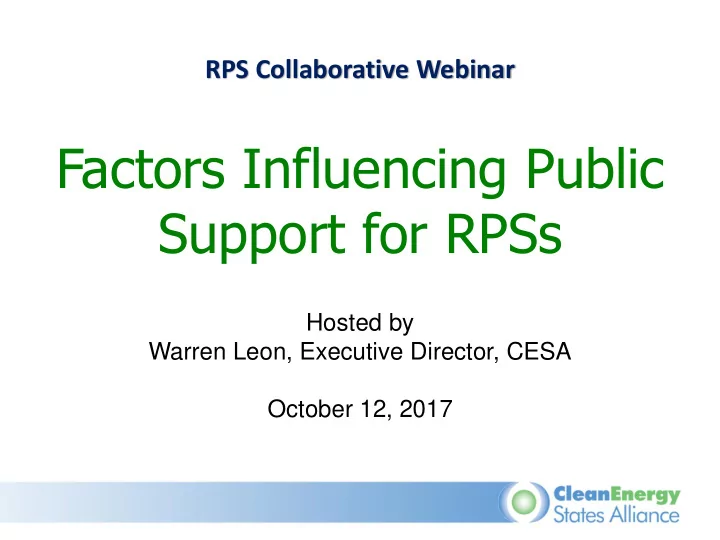

RPS Collaborative Webinar Factors Influencing Public Support for RPSs Hosted by Warren Leon, Executive Director, CESA October 12, 2017
Housekeeping Join audio: • Choose Mic & Speakers to use VoIP • Choose Telephone and dial using the information provided Use the red arrow to open and close your control panel Submit questions and comments via the Questions panel This webinar is being recorded. We will email you a webinar recording within 48 hours. CESA’s webinars are archived at www.cesa.org/webinars
www.cesa.org
RPS Collaborative • With funding from the Energy Foundation and the US Department of Energy, CESA facilitates the Collaborative . • Includes state RPS administrators , federal agency representatives , and other stakeholders. • Advances dialogue and learning about RPS programs by examining the challenges and potential solutions for successful implementation of state RPS programs, including identification of best practices . • To sign up for the Collaborative listserv to get the monthly newsletter and announcements of upcoming events , see: www.cesa.org/projects/renewable-portfolio-standards
Guest Speaker • Leah Stokes , Assistant Professor of Political Science, University of California, Santa Barbara
P R O J E C T D E S C R I P T I O N FACTORS INFLUENCING PUBLIC SUPPORT FOR RPS POLICIES Leah Stokes Clean Energy States Alliance Webinar Assistant Professor October 12, 2017 University of California Santa Barbara
AGENDA • Context: Public opinion on renewable energy and RPS. • Research design: Survey experiment. • Findings: What frames work. • How frames are used in practice: Examples from advocates and opponents. • Concluding thoughts: Using public opinion strategically. • Q&A! 2
CONTEXT: PUBLIC OPINION ON RENEWABLES • Declining support among Republicans. • Increasing polarization in a policy area that was traditionally bipartisan. 3
PUBLIC OPINION ON RPS • Broad correlation between public opinion and RPS policies. • Does not mean public opinion caused adoption. • But public opinion can be used strategically to inform decision-makers. 4
HOW COULD DIFFERENT FRAMES AFFECT PUBLIC SUPPORT FOR RENEWABLE PORTFOLIO STANDARDS? 5
6
RESEARCH DESIGN: REALISTIC SURVEY EXPERIMENT Strongly support Support Oppose Strongly oppose 7
Topic Treatment 1 Treatment 2 Control Most Democrats Most Republicans No partisan Partisan support support bill support bill information Bill would add $10 Bill would add $2 No cost per month to per month to Cost information electricity bills. electricity bills. Bill would probably Bill would probably No jobs create thousands of not create many Jobs information jobs in state jobs in state Bill would reduce No harms harmful air pollution Harms information. including mercury Climate change is a Climate change is No climate Climate change serious problem this not a serious information. bill would address. problem. 8
RESULTS 9
MESSAGING ON POLICY EFFECTS: COST, JOBS & AIR POLLUTION 10
MESSAGING ON POLICY EFFECTS: COST, JOBS & AIR POLLUTION PARTISAN EFFECTS 11
12 MESSAGING ON POLITICS: CLIMATE CHANGE & PARTISAN CUES 12
MESSAGING ON POLITICS: CLIMATE CHANGE & PARTISAN CUES PARTISAN EFFECTS 13
WHERE SUPPORT CROSSES 50% 14
OPPORTUNITIES • Increasing targets in places where the public is very supportive: New Mexico, Iowa. • Targets in supportive places where they do not exist: Florida, Virginia. • Creating more support for RPS policies where they haven’t been passed: Bottom states. 15
HOW FRAMES ARE USED IN PRACTICE PRO-RPS 16
HOW FRAMES ARE USED IN PRACTICE ANTI-RPS 17
OTHER IDEAS Pro-RPS / NEM frames: • “Freedom” of choice, from utility monopolies • “Energy Security” for the United States Anti-RPS / NEM frames: • “Fairness” / “Rights” for net metering customer compensation • “Corporate welfare” linking policies to Solyndra • “Out of state corporations” 18
USING PUBLIC OPINION STRATEGICALLY Texas 1999 - RPS policy (Stokes, 2017): • Deliberative opinion polling exercise • Advocates continuously discussed findings — high public support — with politicians. 19
USING PUBLIC OPINION STRATEGICALLY Today: • A majority in of public in support of ambitious (35%) RPS across 40 states. • Advocates as brokers between politicians and public • Politicians need to be aware of public preferences. They are often not (Hertel-Fernandez, Mildenberger & Stokes, 2017). Advocates need to communicate these preferences. • Advocates can mobilize people - phone calls, letter writing campaigns. 20
CLOSING THOUGHTS • Imposing even small costs on ratepayers will likely reduce support. • Importance of keeping policy costs as low as possible. • Who should pay for renewables / RPS? • Industrial consumer opt- outs’ long term sustainability? • Need for renewed Republican leadership. Some hope from Kansas. • Focus on air pollution and jobs may increase public support. 21
BOOK PROJECT: The Politics of Implementing State Energy Policy Cases: Policy failures + rollbacks Texas RPS Solar Expansion Kansas RPS repeal Ohio RPS freeze Arizona NEM fees Still conducting interviews on these cases. 22
Q U E S T I O N S ? T H A N K Y O U ! L S T O K E S @ U C S B . E D U @ l e a h s t o k e s
Thank you for attending our webinar Warren Leon RPS Project Director, CESA Executive Director wleon@cleanegroup.org Visit our website to learn more about the RPS Collaborative and to sign up for our e-newsletter: www.cesa.org/projects/renewable-portfolio-standards Find us online: www.cesa.org facebook.com/cleanenergystates @CESA_news on Twitter
Recommend
More recommend